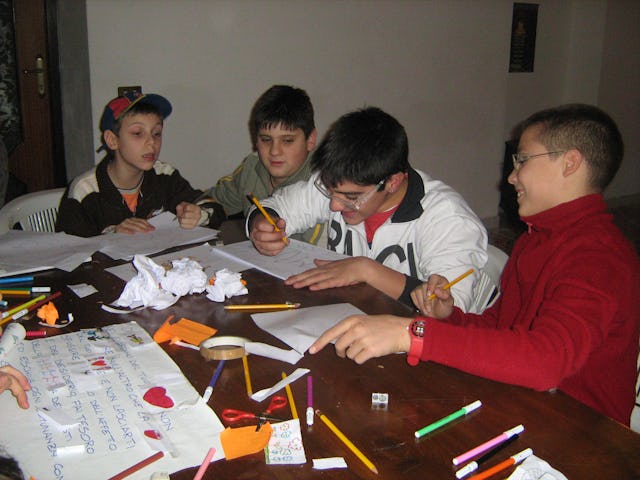Youth program in tough town offers key ingredient – hope
PORTICI, Italy — Alberto Liccardi, 12, lives in the southern Italian city of Portici and says he has some advice for friends that hang out in the streets.
“Instead of doing nothing in the middle of the road, come to the Baha’i Center. It is better for you,” he offers.
Alberto is one of a handful of youth in Portici, a city of 60,000 just southeast of Naples, who have signed up for a Baha’i program for young teens that operates around Italy and elsewhere.
There are about 25 such youth groups in Italy with more than 130 participants. Three-fourths of the youngsters come from outside the Baha’i community.
Designed for youths aged 11 to 14, the program aims to help participants understand their spiritual nature, respect themselves and others, and be of service to the society around them.
Yes, say organizers, the program may help keep kids off the streets where they can get into trouble, but the goals are loftier than that.
Through discussion, service projects, the study of certain texts, games, and music, the youth gain an understanding of their nobility as human beings, said Antonella Demonte, the Baha’i in charge of the program in Italy.
This in turn helps the youngsters resist negative peer pressure and can offer hope and a pattern for a life of service to others, she said.
This is especially important where unemployment, crime, teen pregnancy, and other problems contribute to hopelessness among youth, she said.
“Also, Portici is densely populated and faces economic problems – it is a challenging place to live,” she continued.
Like Alberto, Anna Deluca is only 12, but she is old enough to see what goes on among many of her peers.
“They live in a bad situation,” she says. “They are always on the street, they fight, they smoke…. They live like they were already adults.… At 12 years old they already go dance in other cities, in discos.”
Anna joined the Baha’i program last year, and she talks about responsibility and respect – two key themes of the curriculum.
“Kids don’t have a sense of responsibility for their actions,” she says, “and they don’t respect anybody.”
In Portici, organizers of what Baha’is call the “junior youth” program – in Italian, Attivita’ per giovanissimi – this month are starting their new year and, like last year, expect at least a dozen youngsters to sign up.
Irene Cuce, a 21-year-old Baha’i student at Universita di Verona, spent six months in Portici volunteering with the program. She describes it as a project that helps youth learn about their own spiritual attributes through discussion and by providing service to their communities.
“We can see the results from the program,” she says. “The youngsters feel more comfortable. They feel they can be something in their lives. They have respect for each other now – you can see it in the way they talk with each other.”
Ciro Cangiano, 16, spent three years in the program and agrees that it helps young teenagers develop new values.
“I discovered qualities I didn’t know I had,” he says, “like patience, like wanting to help others.”
Concetta Rosetti, whose 12-year-old daughter, Carla, participates in the Baha’i program, seems equally enthusiastic.
“I think my daughter has become more helpful compared to before. And she has always been insecure, but since she has been going to the Baha’i Center she has become more open to others, and more self-confident,” says Mrs. Rosetti.
She hopes that what her daughter learns in the program will help her make her way in the world.
“There are difficulties to find jobs, and unfortunately Portici doesn’t offer great opportunities for the future of our children,” she says.
Ivana Carluccio, 32, a Baha’i in Portici, strongly supports the program, which she says addresses the causes of despair by focusing on the positive spiritual qualities in each person and the talents one has to help others.
“When you work for this project, you realize that you are doing it because it’s the only solution, the only practical way to really help these youth,” Ms. Carluccio said.
Raffaele Olivieri started in the program two years ago and indicates that things have changed for him: “I think this project gives the youth the possibility to have a more positive vision of their future and as a result the possibility of changing society.”
About the program
Groups are generally small – six to 12 youngsters – to provide ample opportunity for each person to participate, especially in discussion. In Portici, the 12 youths who joined last year were divided into two smaller groups for their classes, which met every Wednesday at the Baha’i Center.
Each group is led by a trained animator, who often is just a few years older than the class members. The relationship between the animator and the participants is key, notes Caroline Custer, a Baha’i who is familiar with the program.
“A special kind of relationship is established,” she says, “which stems from the way animators understand the unique potentialities and capacities of the youth.”
“Also, the atmosphere of the meetings is unique,” she continues. “It is not like a class in school, yet it is not like an informal gathering of friends. The meetings are joyous but at the same time serious.
“Another beautiful aspect of the program is the way material, intellectual, and spiritual excellence are all presented as important aims and are integrated in the junior youth activities.”
